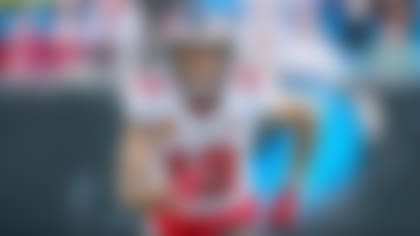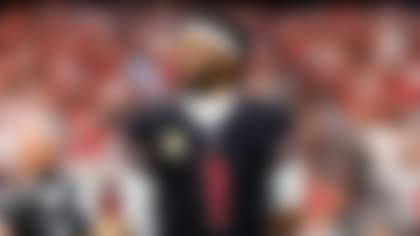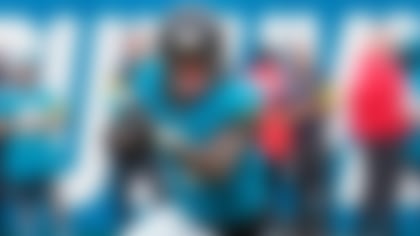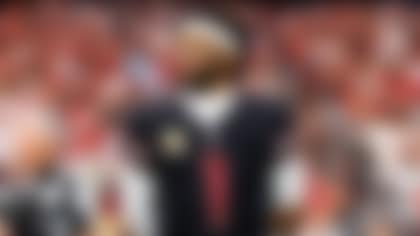ALAMEDA, Calif. -- For a 13-minute stretch of their season opener, the Oakland Raiders moved the ball up and down the field. The rest of the game, it was more like the same old mistake-filled Raiders on offense.
That sums up exactly where the Raiders are early this season. They just might be the most improved team in the league, yet still could be among the NFL's worst in the standings.
That's as much a reflection on how bad the Raiders were a year ago as on how much better they are under coach Lane Kiffin.
Because for all the optimism about an offense that could move the ball and actually score touchdowns, the bottom line is this: The Raiders lost 36-21 at home to a Detroit Lions team that won only three games last year and has more losses than any team since 2001.
"We're looking better," running back LaMont Jordan said. "You always want to look better than you did last year because we looked awful last year. Taking the next step is becoming a winning team, and we obviously didn't do that."
The problems aren't the type that will be solved by top draft pick JaMarcus Russell's imminent signing of a contract. After becoming the first top pick since 1986 to miss the season opener in a contract dispute, Russell will have a long way to go until he's ready to contribute.
The Raiders were inept on offense a year ago when the team failed to score an offensive touchdown in eight games on the way to a 2-14 record. Their 168 points were the fifth fewest in a 16-game season and Oakland allowed a league-worst 72 sacks.
The offense too often relied on deep drops and long-developing pass patterns that led to sacks and turnovers.
"If we're just going to drop back and take five- and seven-step drops and do those things, we won't win games," Kiffin said.
His changes were evident from the first play against Detroit. Oakland lined up with an empty backfield -- a formation the Raiders declined to use even once in 2006, the only NFL team to eschew it, according to Pro Football Prospectus -- and Josh McCown threw a quick pass to Ronald Curry that turned into a 13-yard gain.
That strategy kept up all game as McCown frequently dumped short passes to Curry and Jordan, hoping they would run for big gains. The Raiders gained more than half of their yards passing after the catch, compared with about one-third a year ago, according to STATS LLC.
The quick passes helped avoid sacks; Oakland allowed three all game and only one until the final two minutes.
And for a stretch beginning midway through the third quarter, it worked nearly flawlessly as Oakland put together three straight touchdown drives for the first time since 2005.
McCown had good numbers in his first start since the end of the 2005 season, completing 30 of 40 passes for 313 yards and two touchdowns.
"Stats lie," McCown said. "It makes me sick to lose. I can't stand it. I don't want, after the game, to say, 'Well, there were some positive things.' I don't live in that world. But there are some things to be proud of."
The problem with the dink-and-dunk offense is little mistakes can easily kill a drive. Oakland had three first-half drives of more than nine plays that ended with long missed field goals by Sebastian Janikowski.
A false start by Cornell Green stalled one drive, an ineligible man downfield penalty on Robert Gallery hurt another, and the third was cut short by the end of the half.
"We're not finishing our drives and it's something happening here or there," Kiffin said. "Whether it's a false start here or a missed assignment there, just something little."
That was reminiscent of the mistakes of last year. So were the bigger errors in the fourth quarter. With the Raiders trailing 26-21, McCown threw an interception when defensive end Dewayne White dropped into coverage. That led to a field goal for Detroit.
The fourth quarter also exposed another problem: Oakland's highly acclaimed defense hasn't proved it can stop teams when it matters most.
The Raiders were proud of their third-ranked defense last year, and while some of that was warranted, part of the success can be attributed to opposing offenses spending much of the games in '06 trying to run out the clock and protect a big lead.
The defenders often said a year ago they needed just 17 points from the offense and they would do the rest. But when handed a 21-20 lead with 7:43 to play, the defense let Oakland down.
Detroit easily drove 80 yards downfield, taking advantage of a missed tackle on third down by Hiram Eugene and a lack of a pass rush on the go-ahead, 32-yard pass from Jon Kitna to Shaun McDonald.
"We want the game in our hands, and it was at the end," Raiders safety Stuart Schweigert said. "We just didn't stop them. That's disappointing."
That's the Raiders of late.
Copyright 2007 by The Associated Press



